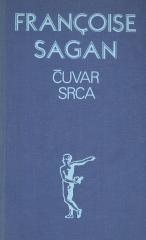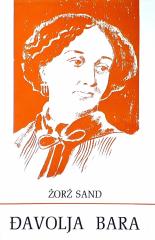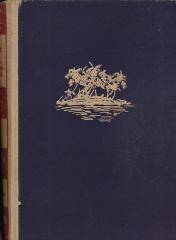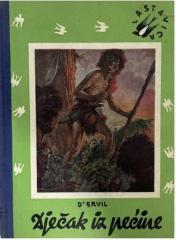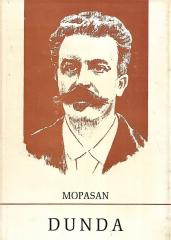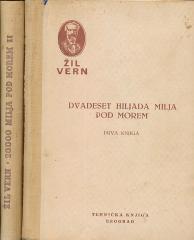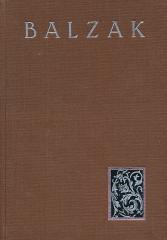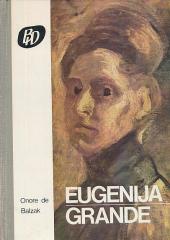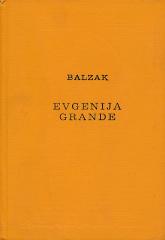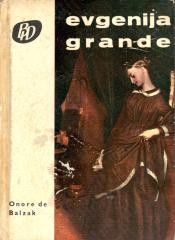Francuska književnost
Čuvar srca
Čuvar srca roman je francuske spisateljice Françoise Sagan objavljen 1968. godine.
Đavolja bara / Mala Fadeta / Nahoče Fransoa
Devil’s Bar schildert das Leben einfacher Bauern in der französischen Provinz Berry. „Little Fadeta“ ist die Geschichte eines Mädchens namens Fadette, das aufgrund seines Aussehens und Verhaltens von der Gemeinschaft abgelehnt wird. Francois erzählt berei
Djeca kapetana Granta
Ein klassisches „Vernevian“-Abenteuer, in dem die Helden immer wieder in Schwierigkeiten geraten, voller unglaublicher Wendungen und gefährlicher Situationen, die den Leser nervös machen, obwohl klar ist, dass die Geschichte ein Happy End haben muss.
Dječak iz pećine
Das Buch „Cave Boy“ beschäftigt sich mit dem Thema prähistorisches Leben und zeigt die Abenteuer und Herausforderungen, denen sich der junge Protagonist in einer Höhlenumgebung gegenübersieht.
Dunda i druge novele
Pripovijetka smještena u vrijeme Francusko-pruskog rata (1870.–1871.), radnja započinje bijegom francuskih građana iz Rouena, pod pruskom okupacijom. Među njima je i Elizabeth Rousset, "Dunda", djevojka lakog morala, no dobrog srca.
Dvadeset hiljada milja pod morem 1-2
Naučnofantastični roman koji je krajem 19. veka napisao čuveni francuski pripovedač za decu i mlade, Žil Vern, koji je takođe bio osnivač žanra naučne fantastike.
Eugenija Grande
„Eženi Grande“ (1833), deo Balzakove Ljudske komedije, je realističan roman koji istražuje pohlepu, porodične odnose i žrtve ljubavi u provincijskom francuskom društvu.
Eugenija Grande
„Eženi Grande“ (1833), deo Balzakove Ljudske komedije, je realističan roman koji istražuje pohlepu, porodične odnose i žrtve ljubavi u provincijskom francuskom društvu.
Evgenija Grande
„Eženi Grande“ (1833), deo Balzakove Ljudske komedije, je realističan roman koji istražuje pohlepu, porodične odnose i žrtve ljubavi u provincijskom francuskom društvu.
Evgenija Grande / Muzej starina
U svojim romanima „Evgenija Grande“ (1833) i „Muzej starina“ (1837), Balzak istražuje univerzalne teme pohlepe, ljudskih strasti, žrtvovanja i moralnih dilema, smeštajući ih u različite društvene kontekste francuskog društva 19. veka.
Književnost
- Aforizmi i vicevi
- Američka književnost
- Antička književnost
- Antologije
- Arapska književnost
- Avanturistički roman
- Bosanskohercegovačka književnost
- Britanska književnost
- Bugarska književnost
- Crnogorska književnost
- Dokumentarna književnost
- Drama
- Epistolarna književnost
- Epska fantastika
- Epska književnost
- Erotska književnost
- Esejistika i dnevnici
- Fantastična književnost
- Filmski scenario
- Filozofski roman
- Francuska književnost
- Grčka književnost
- Horor
- Hrvatska književnost
- Humor i satira
- Indijska književnost
- Iranska književnost
- Izreke, misli, aforizmi, poslovice
- Japanska književnost
- Kineska književnost
- Književna kritika
- Književnost za mlade
- Komedija
- Kratke priče
- Kriminalistički roman
- Latinoamerička književnost
- Latinska književnost
- Ljubavni roman
- Makedonska književnost
- Mađarska književnost
- Moralno-didaktička književnost
- Narodna književnost
- Nemačka književnost
- Novele
- Pjesme u prozi
- Poezija
- Poljska književnost
- Portugalska književnost
- Poslovice i maksime
- Istorijski roman
- Istorija književnosti
- Pripovetke
- Ratni roman
- Proza
- Ruska književnost
- Sažetci i adaptacije književnih dela
- Skandinavska književnost
- Slovenska književnost
- Socijalna književnost
- Srpska književnost
- Italijanska književnost
- Teorija književnosti
- Tragedija
- Thriller
- Turkish literature
- Science Fiction
- Czech literature
- School reading
- Spanish literature
- Jewish literature
